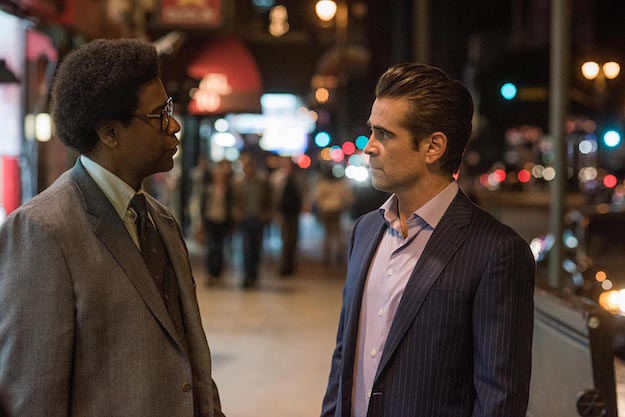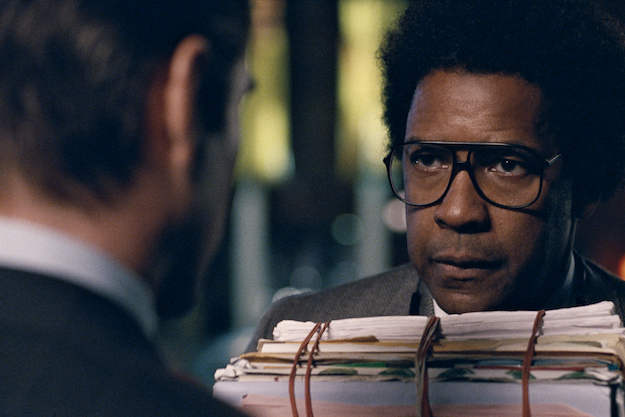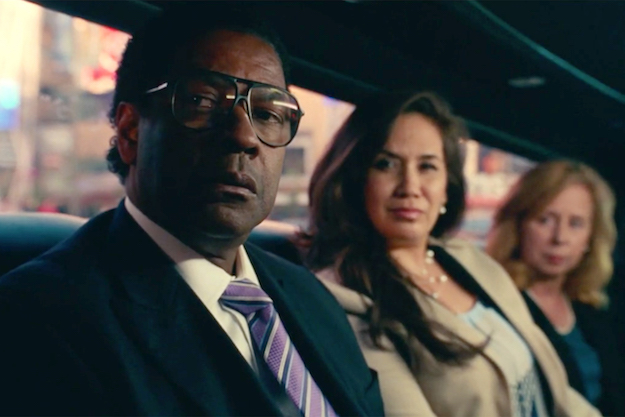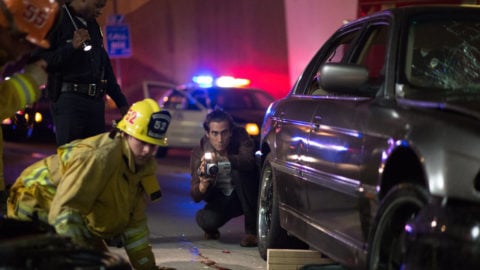Deep Focus: Roman J. Israel, Esq.

When François Truffaut wrote, “Bogart was a good worker,” and emphasized the “hard work” he did in John Huston’s movies, he meant to salute more than Bogie’s professionalism. In his greatest performances, the actor immersed himself in what a character does for a living, whether it was Sam Spade using quick reflexes and fast hands to strip a gunman of his sidearms or Fred C. Dobbs training his eyes for cigarette butts while on the bum in Mexico or Charlie Allnut attuning himself to the African Queen and kicking the engine to life.
Denzel Washington, one of the few contemporary stars with talent and charisma to equal Bogart, also performs at his peak when he plays roles defined by pursuit or profession. Is it any wonder that he made his first vivid screen impression in a workplace TV show, the hospital series St. Elsewhere? For Washington, handling the tools of a trade, whether a stethoscope in St. Elsewhere or a service pistol in Training Day (2001), can be more vitalizing for him than any symbolic gesture or flight of rhetoric. His strongest moments in Fences (2016) come when he’s remembering his baseball days or exchanging trash-collector talk with his friend and fellow worker (Stephen Henderson). In his best recent performance, as a railroad engineer in Tony Scott’s Unstoppable (2010), he and co-star Chris Pine react persuasively both to the challenges of stopping a runaway train and to the complexities of labor in this century, such as the push to shove veterans into early retirement with half benefits, which creates rifts between younger and older employees.
In Dan Gilroy’s Roman J. Israel, Esq., Washington tops himself as the title character. With understated brilliance and apparently effortless empathy, he portrays a legal genius, visionary reformer, and social misfit who has masterminded briefs and courtroom strategies while his renowned partner, a hero of the Civil Rights movement, argues every case and gives public voice to their progressive ideals. The movie tells what happens when the death of this flashy co-founder (whom we never see) propels Israel from his cozy back room into the scalding light of high-powered L.A. Law. Determined to carry on by himself, Israel tries to pursue ongoing cases. We soon learn why he’s rarely faced a judge. He deftly weighs charges and evidence but can’t put the brake to his hurtling thoughts or modulate his behavior to suit the bench. (He swiftly lands a $5,000 contempt charge.) If tested, would he be diagnosed with Autism Spectrum Disorder? (Asperger’s Syndrome has been dropped from the mental-health manuals.) Or is his asymmetrical personality a result of living and working alone, anonymously, for decades? Our relationship to this often heroic and sometimes antiheroic character is personal, not clinical. Gilroy and Washington’s ability to depict this man in the round elicits multiple reactions, all at once. It’s not a “you’ll laugh, you’ll cry” kind of movie. Here we laugh and cry simultaneously.

Washington so thoroughly inhabits this character that we understand his ways of talking to himself out loud or racing through commentaries on actions in real time, as they unfold. We see his galumphing walk and awkward, boxy gestures not as expressions of innate clumsiness but as byproducts of a life lived in his own head.
We also see what fuels his advocacy. He’s furious at a criminal justice system that has become, as Judge Jed S. Rakoff wrote in an essay for The New York Review of Books, “almost exclusively a system of plea bargaining, negotiated behind closed doors and with no judicial oversight,” with outcomes “largely determined by the prosecutor alone.” Unable to land a new job when his firm is dissolved, he accepts a position at the high-end legal mill run by sleek George Pierce (Colin Farrell), who assumes the old firm’s caseload and pays lip service to the values of Israel and his dead partner (Pierce’s former teacher). Israel hopes he can use Pierce’s resources to file a sweeping class-action suit aimed at destroying the plea-bargain assembly line and providing equal legal protection to disadvantaged clients who would otherwise cave into accepting jail time.
In the hands of Gilroy, who debuted as a writer-director with the equally original Nightcrawler (2014), Israel’s predicament dramatizes dizzying changes in liberal and radical attitudes and discourse over the last four or five decades. And it does so with a continually surprising mix of realism and idealism, wised-up comedy and pathos. As Israel enrages radicals and yuppies alike, the movie acknowledges the hazards of every type of activism from grass-roots purism to “working within the system.” Roman J. Israel, Esq. ultimately celebrates the different kinds of energy it takes to push a democracy forward while reckoning with the private sacrifices all that entails. The result is a gritty gem of a movie showcasing a superb collaboration between filmmaker and leading man.

Washington going all in on Israel’s thinking-man’s tensions enables Gilroy to fuel the movie with existential suspense. The lawyer scrapes psychic bottom on the case of a frightened young African-American man accused of murdering a convenience-store clerk. Israel tries to barter the accused man’s knowledge about the brute who actually pulled the trigger for a significantly lesser charge and briefer sentence, then overreacts to an insulting plea deal, with disastrous results for his client. The movie keeps us wondering just how weary is Israel when he says he’s tired of “doing the impossible for the ungrateful.” Well, he trades privileged information for reward money, then plunges headlong into material pleasures, moving from his funky digs at an address where the cops will never monitor the sound pollution to a luxury apartment indistinguishable from those you see on Million Dollar Listing. We wonder whether the change is real or permanent. It’s a comic, queasy reversal: when Roman trims his Afro we question whether he’ll ever get back his authentic self. (In one swift vignette, he tries and fails to tease his tight hair back up and out.)
This volatile midsection lacks the sureness of the movie’s opening and closing; we’re led to think Israel has more of a master plan. But the film’s exploratory ambience keeps the actors—and the audience—open to fresh possibilities. We never stop hoping that Israel will realize he can still perform good work while striking careerist compromises.
Colin Farrell makes Pierce a splendid counterweight to Israel. This resurgent actor delivers something very difficult: a forceful, quicksilver portrait of a mercenary go-getter with, perhaps, a silver lining of social conscience. Farrell provides a secondary line of suspense: does Pierce plan to exploit Israel in good ways as well as bad? And if he does, would Israel ever notice? Farrell creates a ruthlessly efficient and elusive personality who tries to hold Israel’s enthusiasms in check. Pierce’s better angels register as shadows whizzing across his eyes. It’s a modest feat that Farrell lets us see them.

Carmen Ejogo (Coretta King in Selma) creates a full-bodied character out of thin air. She brings to the movie an authentic, questing texture as Maya Alston, the local L.A. head of a national civil rights organization—an idealist who views Israel as a semi-problematic inspiration, but then begins to measure herself against him. Their scenes together offer the quintessence of shared sympathies, bad timing, and mixed signals. Her presence makes it easier for us to bear Israel’s humiliation when a talk he gives to organizers goes awry after he suggests, with his reflexive chivalry, that “brothers” in the packed room should give up their chairs to “sisters” without seats. The scene trenchantly sums up some unforgiving contemporary attitudes while breaking our hearts with its revelation of Israel’s old-school romanticism. He has already explained that “Esquire” is a courtly designation above “gentleman” and below “knight.” His briefcase, as big as a suitcase, has “Roman J. Israel, Esq.” stamped onto it. That briefcase, which holds the files for his revolutionary class-action suit, is Israel’s equivalent of Cyrano de Bergerac’s white plume. Later, it’s poignant and funny when the “new” Roman Israel takes Maya out to a fancy restaurant. She doesn’t register the full change in him. He, like anyone just getting used to four-star restaurants, complains about the tiny portions.
Gilroy has assembled a team of natural-born filmmakers, including cinematographer Robert Elswit and editor John Gilroy (his brother). In their movies, the camera frames the right space in the right light and the action is sometimes stunningly immediate. In Roman J. Israel, Esq., they’re equally adept at nocturnal disasters and waking nightmares. Using the eerie artificial glow of L.A. nights, they conjure open-air claustrophobia when Israel gets mugged on Bunker Hill or tries to stick his card in a homeless dead man’s pocket so the corpse won’t go to potter’s field. (That scene ends in a nifty twist.) As Israel tries to flee L.A. for Las Vegas, the daylight is so oppressive that the atmosphere feels bleached. We share Israel’s edginess: like him, we worry that a tailgating car is carrying two hit men. Production designer Kevin Kavanaugh helps imbue the routines of Israel’s work and home life with the sense of discovery that other craftsmen reserve for unveiling forbidden cities. The shelves of books and vinyl and the posters of Angela Davis and other civil rights icons feel organic.
Kavanaugh and art director Robert Joseph, set decorator Meg Everist, and costume designer Francine Jamison-Tanchuck illuminate Israel as a man out of time, but not frozen in the past. He’s a historical hodgepodge, hanging onto whatever once proved useful to him—a flip phone rather than a smart phone, a computer as bulky as an old TV, file cards and actual cardboard files wrapped in multiple rubber bands. But his habits are rigid: stocking his pantry with identical rows of Jif peanut butter, making 90-degree turns when he’s entering his building, and even squaring off his beach towel in the sand. Washington maintains a dynamic imbalance between his nostalgia for a time when more men and women dreamed of fundamental change and his hyper-focus and OCD.

It’s fitting that the movie homes in on a wall poster of Bayard Rustin, and not merely because the poster’s quote states the movie’s theme: “Let us be enraged by injustice, but let us not be destroyed by it.” Rustin was the civil rights pioneer—the architect of the 1963 March on Washington—whom others pushed into the background because he was a former Communist Party member and a homosexual. Complex and individualistic, Rustin supported gay rights but felt that sexual orientation was “a private matter.” He antagonized some members of the Movement by wanting to broaden the civil rights message “to include all depressed and underprivileged minority groups.”
Seeing his image in Roman J. Israel, Esq. reminded me that Rustin, astonishingly, though a pacifist, supported Israel during and after the Six-Day War, and strove for Jews and blacks to form a united political front. But I think the title character’s name has broader meanings. Roman J. Israel is a man who knows he must “render unto Caesar the things that are Caesar’s, and unto God the things that are God’s.” But he wants to make our payments to the state more just.
Michael Sragow is a contributing editor to Film Comment and writes its Deep Focus column. He is a member of the National Society of Film Critics and the Los Angeles Film Critics Association. He also curates “The Moviegoer” at the Library of America website.







